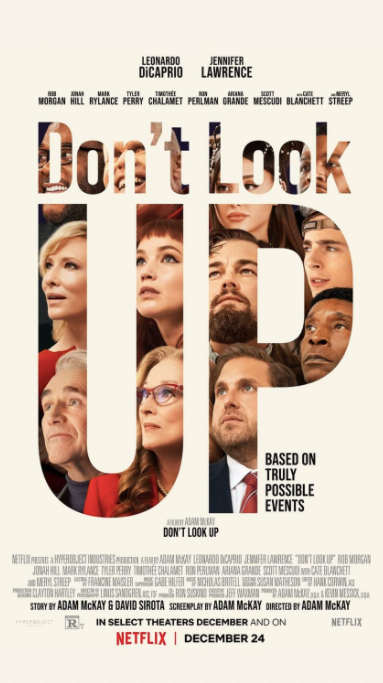
I'm going to check in with a rare pan for me of a science fiction film. Rare not because I love every science fiction movie I've ever seen, but because I usually review only movies that I think are worth seeing. But I'm making an exception with Don't Look Up, because the issue it addresses -- the end of human existence -- is obviously so important. The Netflix movie serves up a variety of narratives and storylines, and, in the end, I think most of them are not worth watching.
[Spoilers ahead ... ]
Let's start with what is worth seeing in this movie, about a comet that's six months away from an extinction-event impact with our planet. I liked some of the satire of our media and politicians, and I liked the acting.
But I didn't like the pessimistic, deeply dispirited ending. Not only did the three major attempts to stop the comet by launching a missile or missiles at the comet fail -- the first one turned back, the second blew up on the launch pad, the third was supposed to hit the comet with multiple explosives, but some of them failed to arrive or ignite, and the result was not enough to knock the comet off course -- but even the attempt to cryogenically save humanity by sending some people on a multi-millenium voyage to an Earth-like planet way out there in space fails as well, as voracious birds attack our people as they come out of their suspended shells, including gobbling up the U.S. President's head. That was a little funny in a perverted slapstick way, but not worth the enduring message of death it delivered.
Now, I'm not saying that both or either of these methods of saving our species would work. But why make a movie that makes that hopeless point? The lampooning of politics and media here on Earth could have worked just as well with at least some ray of hope for our species in the end. (There was a last man on Earth ala The Twilight Zone episode at the end of the movie, but no indication was given that humanity would survive via that guy, either. I suppose it’s possible that if he survived, other people did, too. If so, that should have been shown. It would be a little difficult for one person to re-propagate our species.)
Watching movies and television series, for me, is a form of entertainment. The reality which it describes and plays off of can be dangerous and deadly. But it's not hopeless, and I don't like and wouldn't recommend a movie that traffics so completely in despair.

2 comments:
I may have misunderstood, but I thought it was meant as a black comedy - not a serious look at our chances of survival. The comet was a metaphor for climate change and other more slow-motion disasters. And the movie was about the staunch refusal of so many people to address the real problem.
The people who finally "win" control over the solution are ruthless capitalists, looking to make money from the impending disaster, with typical Silicon Valley hubris.
The beautiful, hopeful ending is that we still have it in our power at any moment to turn to one another with love and support.
So I guess I had a different experience.
Thanks for your thoughtful comment. I wish the movie did have the message that it was still in our power to make things better with mutual love and support. But, instead, it left no one on Earth to provide that support, since the extinction-level event apparently spared only one person. The hopeful ending is us, outside of the movie, and I think we didn't need to see such a depressing movie to draw upon that love and support. We are already well aware of the ravages of COVID, the dangers of climate change, etc.
Post a Comment